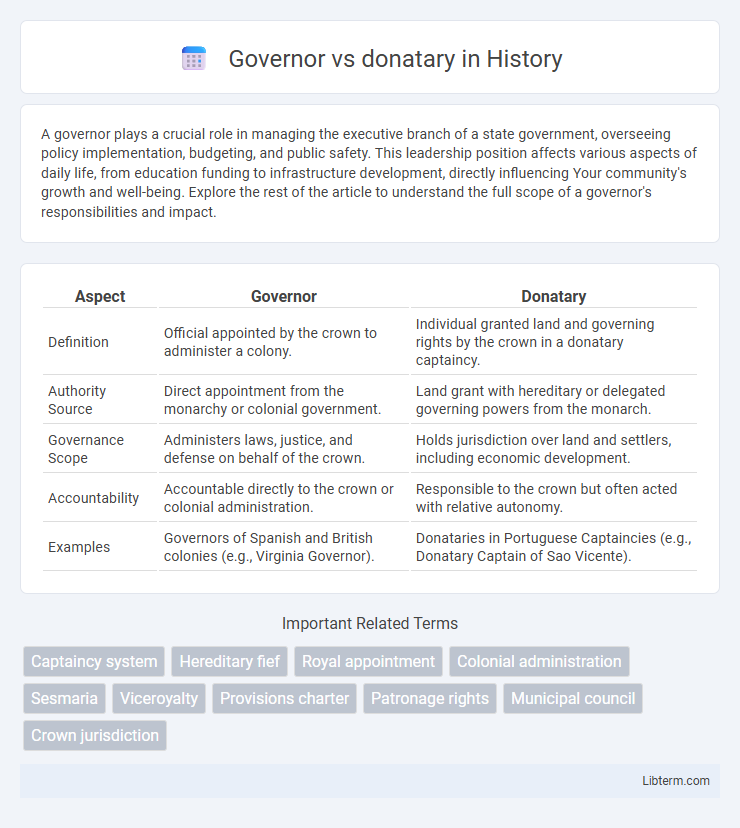A governor plays a crucial role in managing the executive branch of a state government, overseeing policy implementation, budgeting, and public safety. This leadership position affects various aspects of daily life, from education funding to infrastructure development, directly influencing Your community's growth and well-being. Explore the rest of the article to understand the full scope of a governor's responsibilities and impact.
Table of Comparison
| Aspect | Governor | Donatary |
|---|---|---|
| Definition | Official appointed by the crown to administer a colony. | Individual granted land and governing rights by the crown in a donatary captaincy. |
| Authority Source | Direct appointment from the monarchy or colonial government. | Land grant with hereditary or delegated governing powers from the monarch. |
| Governance Scope | Administers laws, justice, and defense on behalf of the crown. | Holds jurisdiction over land and settlers, including economic development. |
| Accountability | Accountable directly to the crown or colonial administration. | Responsible to the crown but often acted with relative autonomy. |
| Examples | Governors of Spanish and British colonies (e.g., Virginia Governor). | Donataries in Portuguese Captaincies (e.g., Donatary Captain of Sao Vicente). |
Introduction: Defining Governor and Donatary
A governor is an appointed official who administers a colony or territory on behalf of a sovereign or central government, managing local affairs and enforcing laws. A donatary, in contrast, is granted extensive land and governing rights by a monarch as part of a hereditary or semi-feudal system, often with powers to collect taxes and appoint officials within their donatory. Both roles played pivotal parts in colonial administration, with governors representing direct royal authority while donatary holders exercised semi-autonomous control over designated lands.
Historical Origins of Governor and Donatary Roles
The roles of governor and donatary originated from different colonial administrative systems, with governors typically appointed by monarchies to oversee territories and enforce royal authority, while donataries were granted hereditary rights to administer specific lands and manage colonization efforts. The governor's role emerged primarily in the context of centralized colonial empires such as the Spanish and British, functioning as direct representatives of the crown with military and judicial powers. Donatary roles were prominent in Portuguese colonial ventures, particularly in Brazil, where kings granted large land parcels to noblemen or merchants who assumed quasi-sovereign control over those territories.
Jurisdiction and Administrative Authority
Governors exercised direct royal jurisdiction and administrative authority over a well-defined territory, enforcing laws, collecting taxes, and commanding military forces on behalf of the crown. Donataries, granted extensive territorial rights by the monarch, held quasi-feudal jurisdiction with significant autonomy to govern, establish local laws, and manage economic resources, often acting as hereditary lords. While governors operated as official state representatives with centralized oversight, donataries wielded decentralized administrative power, blending private ownership with delegated sovereignty.
Appointment and Term of Office
A governor was typically appointed by the crown or central authority, serving at the pleasure of the appointing power with no fixed term, often replaced based on political or administrative considerations. In contrast, a donatary received a hereditary grant and governed their landholdings with more autonomy, usually holding office for life or until they relinquished their rights. The appointment of governors was administrative and political, while donataries operated under feudal-like privileges with longer, often indefinite terms tied to ownership.
Powers and Responsibilities
Governors held executive and military authority over a colony, responsible for implementing royal policies, maintaining order, and overseeing defense. Donataries possessed proprietary rights granted by the crown, combining administrative powers with economic control, including tax collection and land distribution. While governors acted as direct representatives of the monarchy with limited personal profit, donataries wielded semi-sovereign powers with significant autonomy in managing colonial revenues and governance.
Relationship with the Central Government
Governors operated as direct representatives of the central government, wielding authority granted and supervised by the crown to ensure implementation of royal policies. Donataries exercised broader autonomous control over their territories, granted by royal charters, managing local administration and economic development with minimal interference. The central government maintained oversight of governors through regular reports while relying on donataries' loyalty to uphold the crown's interests in distant colonies.
Economic and Fiscal Functions
Governors exercised comprehensive economic and fiscal functions, including tax collection, management of royal revenues, and regulation of trade within the colony, ensuring direct control under the Crown. Donataries primarily focused on local resource exploitation, agricultural development, and were responsible for generating revenue through land grants and overseeing economic activities in their hereditary territories. The governor's role centered on maintaining fiscal order and maximizing profit for the monarchy, while donataries balanced economic objectives with settler interests and territorial administration.
Influence on Local Governance
Governors held official authority appointed by a sovereign state, directly influencing local governance through formal administration, legal enforcement, and policy implementation. Donataries, often granted hereditary land rights and privileges, exerted influence predominantly via economic control and social hierarchy within their territories. The governor's power was institutional and subject to central oversight, while the donatary's influence relied heavily on land ownership and local customs.
Legacy and Impact on Colonial Administration
Governors in colonial administration typically represented direct royal authority, establishing centralized governance structures and implementing standardized policies that shaped long-term institutional frameworks. Donataries, granted semi-feudal rights over territories, influenced localized administrative practices by fostering autonomous economic development and social hierarchies, which often led to diverse colonial legacies. The contrasting governance models of governors and donataries significantly impacted the evolution of colonial administration, affecting legal systems, land tenure, and the integration of indigenous populations.
Conclusion: Key Differences and Contemporary Relevance
Governors functioned as official representatives of the crown overseeing administrative and judicial duties, while donataries held proprietary rights with significant autonomy over their territories during colonial times. The key difference lies in governance authority versus ownership privileges, influencing colonial management systems and land distribution practices. Contemporary relevance persists in legal and historical contexts, affecting property rights and regional governance models in former colonial regions.
Governor Infographic

 libterm.com
libterm.com